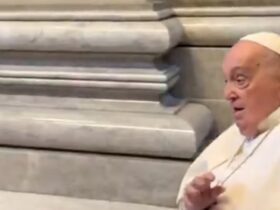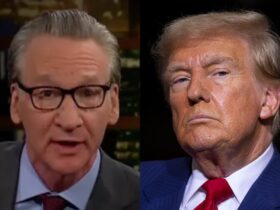This article is part of HuffPost’s biweekly politics newsletter. Click here to subscribe.
Earlier this week, one of the Trump administration’s gambits came up against a major stumbling block: the entire institution of Harvard University.
The administration had demanded Harvard University follow several directives meant to prioritize President Donald Trump’s culture war agenda, including ending diversity programs, promoting right-wing faculty members, and preventing the admittance of students who don’t have “American values” — a thinly veiled way of demanding the college prioritize Trump supporters. If the university didn’t, the administration threatened, it would withhold $2 billion of federal funding, money that was needed for research on topics like medicine, agriculture and engineering.
It was part of a conservative playbook of threatening elite universities in Trump’s second term. In February, the U.S. Department of Education demanded that universities comply with its demands over admissions, student activists and diversity programs or else risk losing their federal funding.
The Trump administration had made similar demands of Columbia University, threatening to withhold $400 million in funding if the school did not ban face masks on campus and allow the Trump administration to control several of its departments, including programs that focus on the Middle East. Ultimately, the school capitulated.
But Harvard didn’t. In public statements, the university essentially told Trump no, they would not be caving to his threats.
“No government — regardless of which party is in power — should dictate what private universities can teach, whom they can admit and hire, and which areas of study and inquiry they can pursue,” Alan Garber, the president of Harvard, said in an open letter to the community on Monday.
For years, the Republican Party has fashioned itself as the party of free speech. They have alleged that diversity of opinion, beliefs and thought was central to their ideology and anyone who disagreed was trying to censor them. And while their protestations always seemed shallow — after all, they seem to only be arguing for the right for conservatives to say what they want without repercussions — with Donald Trump back in power it seems as if we’ve entered a new phase in the battle over not just free speech, but the ability to shape the way Americans think in the first place.
From trying to exert control over what universities can teach and which students they admit, to attempting to defund public media, or deporting college students whose opinions they don’t like, the Trump administration is trying to police the thoughts and beliefs of many of America’s major institutions.
“It’s both absurd and dangerous at the same time,” Kristen Shahverdian, the program director of campus free speech at PEN America, a nonprofit that promotes free expression, told HuffPost.
“He’s seeking to control education, the press, law firms, because there are major institutions that serve as the places that speak truth and are doing the work of pushing back,” she said.
In his second term, Trump isn’t just trying to exert control over the entire federal government — he’s also taking aim at the major institutions that shape public life. If Trump can control what colleges can teach, which news outlets can report on his harmful policies, and what ideas are allowed to be discussed, he can reshape American life as we know it.
“Authoritarian rulers have strong incentives to control the information environment in order to suppress individuals, ideas and organizations that can enable mobilization against them,” Jennifer Pan, a political scientist and professor at Stanford University, told HuffPost.
Trump’s multifaceted war on information boils down to the need to suppress criticism and opposition. But it also encompasses the need to quash the ability for dissenting ideas to spread to others — just last week, Immigration and Customs Enforcement posted on social media that it was their job to prevent illegal ideas from crossing the border.
Because the Trump administration also is straight-up going after individuals, and particularly immigrants, with opinions it doesn’t like.
After Mahmoud Khalil was arrested by Immigration and Custom Enforcement agents last month in the lobby of his apartment building in New York City, his family, lawyers, and wider public wanted to know what the 28-year-old legal permanent resident could have done to warrant his detention.
But the government did not say that Khalil had committed a crime. In a court filing, Secretary of State Marco Rubio, who had ordered the revocation of Khalil’s green card, said that his pro-Palestine beliefs do not align with American interests, and thus he could be deported under the Immigration and Nationality Act of 1952. Khalil, a graduate student at Columbia University in New York, is heavily involved in the pro-Palestine student movement — something that the Trump administration has been trying to crack down on.
“The foreign policy of the United States champions core American interests and American citizens and condoning anti-Semitic conduct and disruptive protests in the United States would severely undermine that significant foreign policy objective,” Rubio wrote, per NBC.
Put plainly, Khalil has been detained and is threatened with deportation because of his opinions, in what appears to be a clear violation of his First Amendment rights. He remains in detention while his lawyers appeal a judge’s decision that moved him one step closer to being deported.
Khalil is not alone. The Department of State is canceling hundreds of student visas, leaving international students in a panic about their legal status and their academic futures. Most of them aren’t guilty or even accused of serious crimes. But Rubio has justified the cancellations, saying that students must prove that they aren’t acting against national interests, by which he refers to pro-Palestinian beliefs. “Every time I find one of these lunatics, I take away their visas,” he said last month. In the meantime, many students are suing the government saying they were denied due process.
While colleges and universities must decide if they will allow the Trump administration to essentially take control of their academic programs and admissions processes while deporting its students, the media is also facing attacks.
“Two of the most important channels of information for the public are the education system and media,” Pan said. “Ensuring that these two channels promote the autocrat’s views rather than alternative views is crucial, which is why authoritarian regimes censor opposition media and civil society.”
Trump has been at war with the media for decades, repeatedly calling for any journalism outfit that dared criticize his policies or portray him in a way he didn’t personally approve to lose their television license.
“They are not a ‘News Show,’ but a dishonest Political Operative simply disguised as ‘News,’ and must be responsible for what they have done, and are doing,” Trump posted to Truth Social after CBS’s “60 Minutes” aired segments about Russia’s war in Ukraine and the Trump administration’s attempts to buy Greenland.
He has also attempted to outright control reporting on his administration: He is currently waging a legal war against The Associated Press for its refusal to refer to the Gulf of Mexico as the “Gulf of America,” barring its reporters from covering the White House and defying a court order that the news service be reinstated.
And this week, the White House said it is planning on asking Congress to strip funding for NPR and PBS, the two biggest public broadcasting stations in the country, saying that the outlets “spread radical, woke propaganda disguised as ‘news.’” The examples in the White House statement are primarily of content that focuses on LGBTQ stories and examinations of race or discrimination, both targets of the right-wing culture wars.
Russ Vought, the director of the Office of Personnel and Management, told Fox News that PBS needed to be defunded because it was “putting drag queens in children’s programs, doing documentaries pushing for reparations, and dividing the country on the basis of race.”
Conservatives have complained about public media for years, saying it’s biased toward liberal viewpoints, but their calls to defund it haven’t really gone anywhere. The resources for PBS and NPR are barely a blip in the budget, and many of their stations serve rural areas and air popular programming like “Sesame Street” for children. If Congress decides to defund them, hundreds of stations could be forced to shut down.
We’ve already seen this ideological battle play out in Republican-led states. After Florida Gov. Ron DeSantis (R) won the governor’s race in 2022, he started a campaign against “wokeness,” claiming radical leftists were indoctrinating children at school. Now the Sunshine State is home to some of the most repressive laws, including ones that limit discussions about racial justice or LGBTQ+ themes in classrooms and remove books that can help schoolchildren learn the benefits of a multiracial and democratic society. The result has left Florida educators afraid to speak freely in their own classrooms and created an atmosphere of fear among the LGBTQ+ community. .
It’s a model that could take over the country if Trump and his cronies are successful in their plan to attack all of our public institutions. Trump doesn’t just want universities to hire his supporters or for CBS to say nice things about him, he wants the entire country to bend to his will.
“It’s important to note that censorship is one of a bundle of strategies used by authoritarian regimes to hold power,” Pan said. “Censorship is used alongside cooptation, repression and propaganda, and these elements can be mutually reinforcing.”
















Leave a Reply